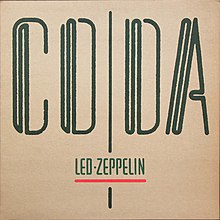Coda (album)
| Coda | ||||
|---|---|---|---|---|
 |
||||
| Studio album by Led Zeppelin | ||||
| Released | 19 November 1982 | |||
| Recorded | 9 January 1970 – 21 November 1978, overdubs 1982 | |||
| Studio | Sol Studios, Cookham, Berkshire, England | |||
| Genre | ||||
| Length | 33:04 | |||
| Label | Swan Song | |||
| Producer | Jimmy Page | |||
| Led Zeppelin chronology | ||||
|
||||
| Professional ratings | |
|---|---|
| Aggregate scores | |
| Source | Rating |
| Metacritic | 78/100 |
| Review scores | |
| Source | Rating |
| AllMusic | |
| Robert Christgau | B+ |
| Classic Rock | 7/10 |
| Collector's Guide to Heavy Metal | 8/10 |
| The Daily Telegraph | |
| MusicHound | 3/5 |
| Pitchfork | 7.3/10 |
| Q | |
| Rolling Stone | |
| The Rolling Stone Album Guide | |
Coda is the ninth and final studio album by the English rock band Led Zeppelin, released in 1982. The album is a collection of unused tracks from various sessions during Led Zeppelin's twelve-year career. It was released two years after the group had officially disbanded following the death of drummer John Bonham. The word coda, meaning a passage that ends a musical piece following the main body, was therefore chosen as the title.
Guitarist Jimmy Page explained that part of the reasoning for the album's release related to the popularity of unofficial Led Zeppelin recordings which continued to be circulated by fans:
Coda was released, basically, because there was so much bootleg stuff out. We thought, "Well, if there's that much interest, then we may as well put the rest of our studio stuff out".
John Paul Jones recalled:
They were good tracks. A lot of it was recorded around the time punk was really happening... basically there wasn't a lot of Zeppelin tracks that didn't go out. We used everything.
The fifth Swan Song Records album for the band, Coda was released to honour contractual commitments to Atlantic Records and also to cover tax demands on previous monies earned, cleared away close to all the leftover tracks from the various studio sessions of the 1960s and '70s. The album was a collection of eight tracks spanning the length of Zeppelin's twelve-year history.
"We're Gonna Groove" opens the album and, according to the album notes, was recorded at Morgan Studios in June 1969. It was later acknowledged to have come from a January 1970 concert at the Royal Albert Hall, with the guitar parts overdubbed and the original guitar part removed—this can be heard in the original Royal Albert Hall show on 9 January 1970. This song was used to open a number of concerts on their 1969 tours and was originally intended to be recorded for inclusion in Led Zeppelin II. "I Can't Quit You Baby" is taken from the same concert as "We're Gonna Groove" but was listed as a rehearsal in the original liner notes. The recording was edited to remove the overall "live" feel: the crowd noise as well as the beginning and ending of the song were deleted. Crowd tracks were muted on the multitrack mixdown on this recording as with "We're Gonna Groove."
...
Wikipedia
